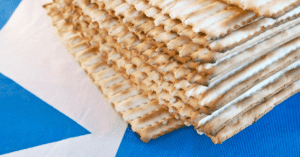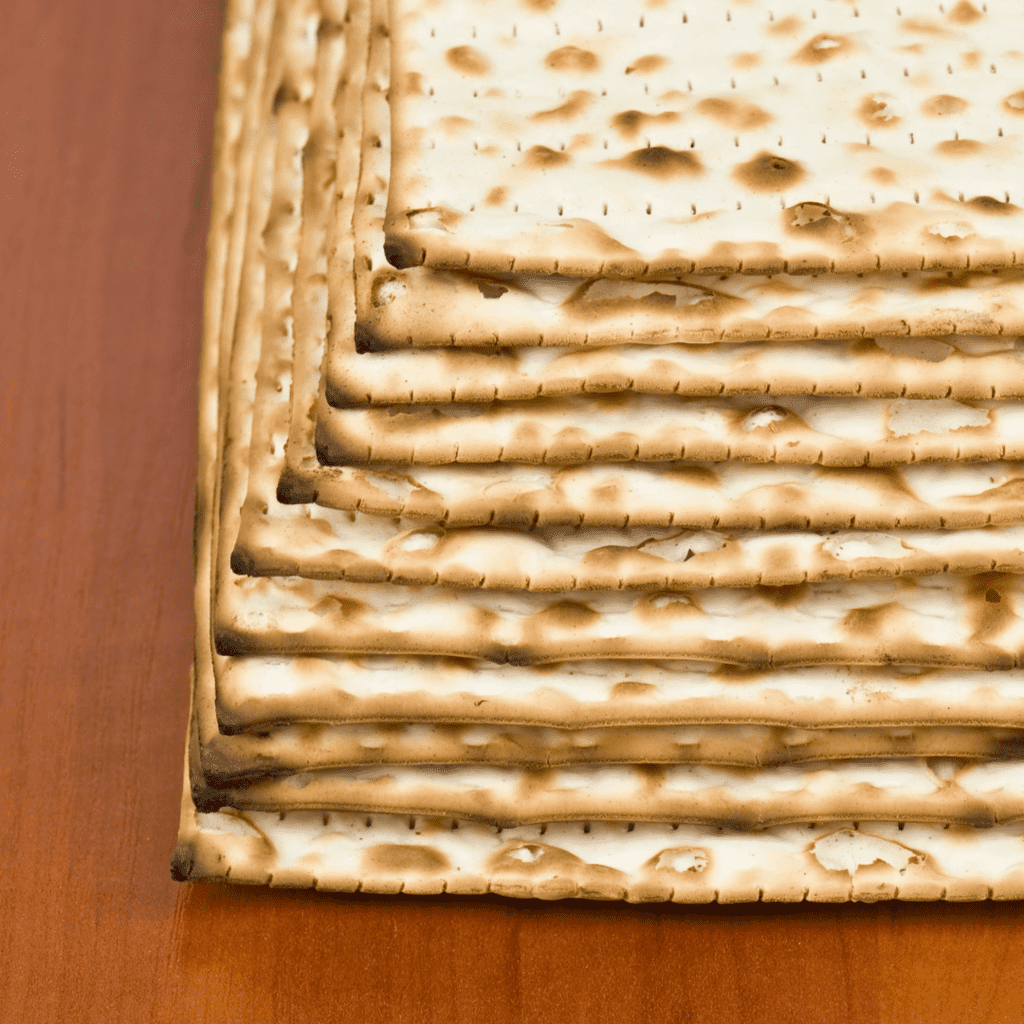
Unleavened bread, a simple yet profound staple, has been a part of human history and culture for thousands of years. From its biblical significance to its nutritional benefits, unleavened bread holds a unique place in our diets and traditions.
Unleavened bread is a type of bread made without yeast or other leavening agents. It has deep historical roots, particularly in biblical traditions, and offers various health benefits due to its simple, whole-food ingredients.
Join us as we embark on a journey to explore the rich history, nutritional value, and cultural significance of unleavened bread. Whether you’re a history buff, a food enthusiast, or someone seeking a healthier lifestyle, this comprehensive guide to unleavened bread is for you.
Unleavened Bread in Biblical History and Culture
Unleavened bread is a flatbread made without yeast. It’s an important part of Bible stories and traditions.
Unleavened bread, or “matzoh” in Hebrew, started during the Exodus. This is when the Israelites left Egypt. They left so quickly they didn’t have time to let their bread rise. So, they made unleavened bread. Today, Jewish people still eat unleavened bread during Passover.
With the dough the Israelites had brought from Egypt, they baked loaves of unleavened bread. The dough was without yeast because they had been driven out of Egypt and did not have time to prepare food for themselves. Exodus 12:39
In the Bible, yeast often stands for sin. This is because a little yeast can spread through all the dough, just like a little sin can spread through a person’s life. So, eating unleavened bread during Passover is like saying you’re free from sin.
“A little yeast works through the whole batch of dough.” Galatians 5:9
Unleavened bread is part of many Bible events. For example, at the Last Supper, Jesus broke unleavened bread. He said it was like his body, which would be broken on the cross (Luke 22:19). This started the Christian practice of Communion. In Communion, people eat bread and drink wine to remember what Jesus did.
Nutritional Benefits of Unleavened Bread
Unleavened bread is a simple food made from flour and water. It’s full of good nutrients and is good for your health.
Unleavened bread, also known as flatbread, is good for you. It doesn’t have yeast or other things that make bread rise. This is good for people who can’t eat certain foods.
Unleavened bread gives you energy because it has carbohydrates. It’s also low in fat, which is good if you’re watching your weight.
Here’s what’s in unleavened bread:
- Calories: Unleavened bread has fewer calories than regular bread. One piece has about 110 calories.
- Carbohydrates: Unleavened bread has about 24g of carbs. This gives you energy.
- Protein: Unleavened bread has a little protein, about 3g in each piece.
- Fat: Unleavened bread has almost no fat.
- Fiber: If you choose whole grain unleavened bread, you’ll get more fiber. This is good for your stomach.
You can eat unleavened bread in many ways. You can use it for sandwiches, wraps, flatbread pizzas, and even desserts.
Even though unleavened bread is good for you, you should also eat other healthy foods. This will give you a balanced diet.
Traditional Methods of Preparing Unleavened Bread
Unleavened bread, a simple yet significant food item, has been a part of human diets for centuries. It’s not just a staple food but also a symbol of history, culture, and faith. Let’s dive into the traditional methods of preparing this humble bread.
Traditional Recipes
Unleavened bread is made with minimal ingredients, usually just flour, water, and a bit of salt. The absence of yeast or any other leavening agent results in a flat, dense bread. This simplicity is what makes unleavened bread so versatile and timeless.
In biblical times, unleavened bread was made by mixing flour and water to form a dough, which was then flattened and cooked on a hot surface. This method has been passed down through generations and is still used today in many cultures.
Ingredients
The primary ingredients for unleavened bread are:
- Flour: This can be any type, such as wheat, rye, or barley. Each type of flour gives the bread a unique flavor and texture.
- Water: This is used to bind the flour and form a dough.
- Salt: While not always used, salt can enhance the flavor of the bread.
Some recipes might include additional ingredients like olive oil or honey for flavor, but the basic recipe remains the same.
Step-by-Step Instructions
Here’s a simple recipe to make traditional unleavened bread at home:
- Combine 2 cups of flour and 1 teaspoon of salt in a bowl.
- Gradually add about 1 cup of water, stirring until the dough comes together.
- Knead the dough for about 5 minutes until it becomes smooth and elastic.
- Divide the dough into small balls, about the size of a golf ball.
- Roll out each ball into a flat disk, about 1/4 inch thick.
- Heat a skillet over medium-high heat. Cook each disk for about 2 minutes on each side, or until it puffs up and turns golden brown.
- Serve the bread warm, or let it cool and store in an airtight container.
This bread can be enjoyed on its own, or used as a base for sandwiches, wraps, or even pizzas. Its simplicity and versatility make it a valuable addition to any meal.
Remember, the beauty of unleavened bread lies in its simplicity. It’s a humble food that carries a rich history and tradition. So, the next time you prepare unleavened bread, take a moment to appreciate its significance and the hands that have prepared it over centuries.
Spiritual Significance
Unleavened bread holds a deep spiritual significance in the Bible. It’s more than just a type of bread; it’s a symbol of purity, freedom from sin, and spiritual nourishment.
Unleavened Bread in the Bible
Unleavened bread, known as “matzoh” in Hebrew, is bread made without yeast. It’s mentioned in the Bible during the Passover, a festival commemorating the Israelites’ exodus from Egypt. The Israelites ate unleavened bread because they left Egypt in a hurry and didn’t have time for the bread to rise.
For seven days you are to eat bread made without yeast. On the first day remove the yeast from your houses, for whoever eats anything with yeast in it from the first day through the seventh must be cut off from Israel. Exodus 12:15
In the Bible, leaven (yeast) often symbolizes sin. Just like yeast causes bread to rise, sin can grow and spread, leading to spiritual death. By eating unleavened bread, believers symbolically partake in a sin-free, pure meal, reminding them of their call to live a life free from sin.
Unleavened Bread and Jesus
Jesus, known as the ‘Bread of Life’, is often associated with unleavened bread. In John 6:35, Jesus says, “I am the bread of life. Whoever comes to me will never go hungry, and whoever believes in me will never be thirsty.” This statement signifies that Jesus, like the unleavened bread, provides spiritual nourishment and satisfaction.
Unleavened Bread and Spiritual Lessons
The act of eating unleavened bread during the Passover is not just a tradition; it’s a spiritual lesson. It teaches believers about the importance of purity, the need for deliverance from sin, and the spiritual nourishment that comes from Jesus, the Bread of Life.
Unleavened bread is a powerful symbol in the Bible. It represents purity, freedom from sin, and spiritual nourishment. As believers partake of unleavened bread, they are reminded of these spiritual truths and the call to live a life free from sin.
Unleavened Bread Conclusion
Unleavened bread, a simple food with a rich history, carries deep significance. It’s a symbol of haste from the Exodus, a wholesome food, and a spiritual emblem in religious rituals.
Whether you’re baking it at home or incorporating it into your diet, unleavened bread is a testament to the simplicity and humility of our ancestors. It’s a reminder of the spiritual significance that food can hold in our lives.
The next time you enjoy unleavened bread, remember its rich history, its nutritional benefits, and its spiritual significance. Let it nourish not just your body, but also your soul.

